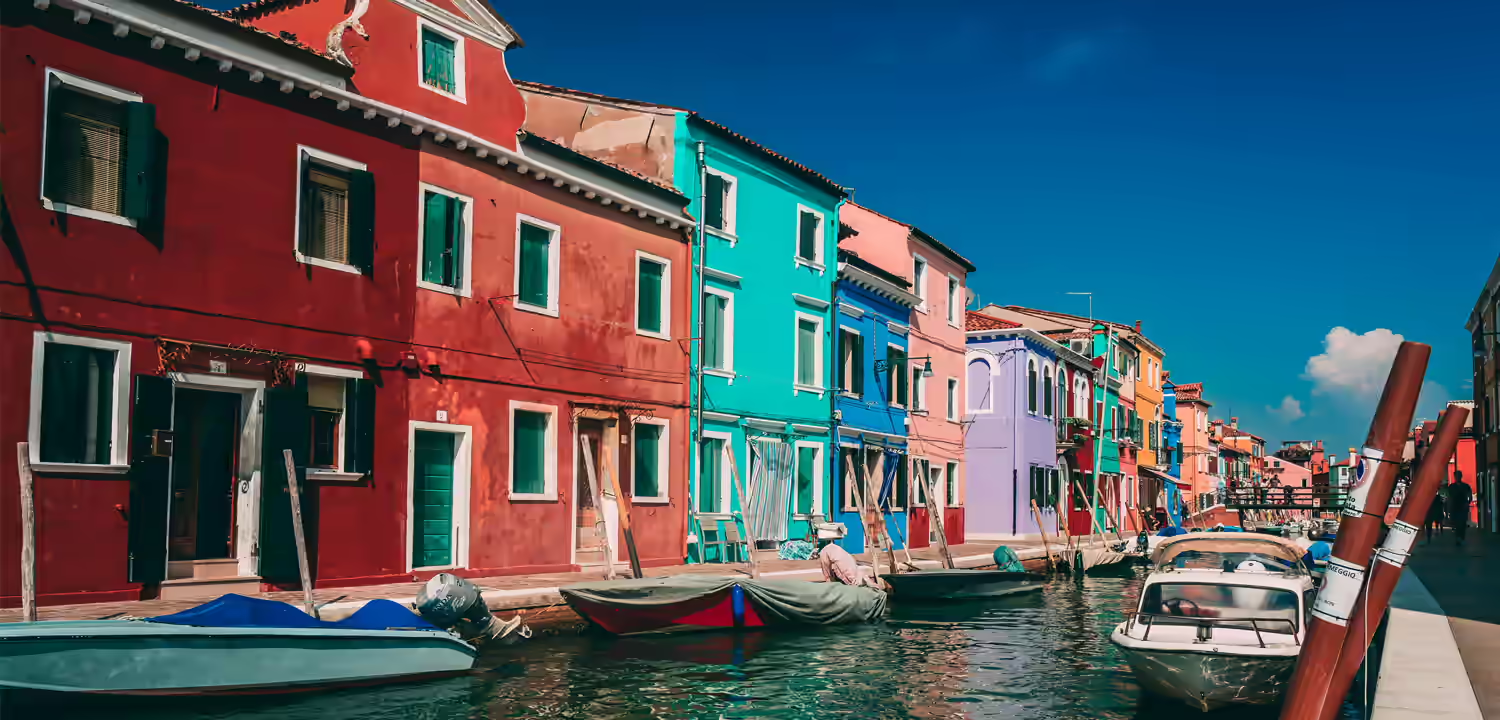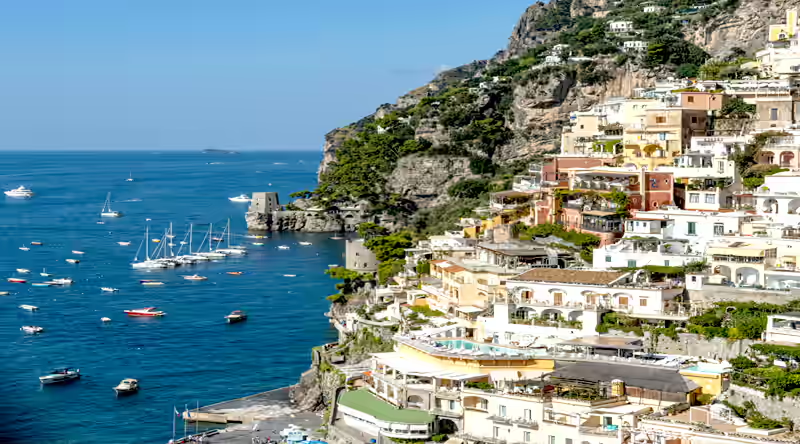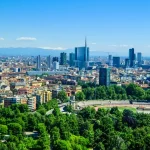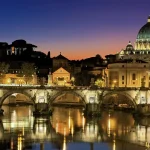
Complete guide to studying in Italy
Everything you need to know about becoming an international student in Italy
Five top reasons to study in Italy
- Cheaper living costs and tuition fees that many other European nations
- Historic and high quality universities
- High quality of life and exciting culture and history to explore
- Favourable Mediterranean climate
- Study in English or Italian
A quick introduction to Italy
Located in the south of Europe, Italy is a mediterranean country that at its southernmost tip is not very far away from Tunisia in North Africa.
Italy is an EU country and as such it follows the Bologna process and the European Credit Transfer and Accumulation System (ECTS), which means that any grades that you achieve in Italy will be recognised throughout Europe.
If you are thinking about studying abroad in Italy, you are in good company. There are over 100,000 international students currently studying in Italy, and these students are attracted to study in the country due to its low tuition fees and living costs, the high quality of education and the country’s unique blend of culture and history.
Articles related to studying in ItalyItaly is a popular destination for students in Europe but you will also find international student communities with strong representation from all over the world. These include large groups form parts of the Middle East (particularly Türkiye and Iran), South Asia (India and Pakistan) and parts of North and West Africa (Morocco, Egypt and Cameroon).
With a declining domestic student population in Italy, international students are as in-demand in the country as they have ever been.
Italy’s higher education system
The majority of the 99 universities in Italy are publicly funded state universities. There are 61 of these universities, which tend to have very affordable tuition fees.
Italy is home to some of the oldest universities in the world, such as the University of Bologna (established in 1088), and the University of Parma (established in 1177). These universities also happen to be some of the world’s most prestigious universities, regularly featuring highly in university world ranking tables.
In addition to public universities, the are 20 non-state universities, some of which at the very least can be considered old universities, such as Bocconi University, in Milan (established in 1902) and Università degli Studi Suor Orsola Benincasa, in Naples (established in 1864).
If you want to study in Italy at masters level, quite unique to Italy are Superior Graduate Schools/universities of excellence (Scuola Superiore Universitaria), which specialise in postgraduate education. There are 7 of these institutions in Italy, including the Scuola Normale Superiore di Pisa and Scuola Superiore Studi Pavia IUSS.
For a comprehensive list of institutions, see our all universities in Italy page.
Italy follows the Bologna process, which means that the university education in Italy follows the 3 cycle system, so degrees in Italy fall into the following types:
- Bachelors degrees, which typically take 3 years to complete
- Masters degrees, which take between 1-2 years to complete
- Doctorates, which take between 3-4 years to complete
University rankings
If you are choosing a university abroad for your studies, we recommend that you take university ranking performance into account. Ranking tables provide an easy method of comparing your choices based on how they perform across a variety of metrics.
Italy boasts a collection of some of the most respected universities in the world, and as such they have a track record of featuring in world university ranking tables.
Our table below shows the top 15 universities in Italy according to 3 well known university ranking systems:
| University | Times Higher Education World University Ranking | Best Global Universities | QS World University Ranking |
| University of Bologna | 155 | 130 | 133 |
| Scuola Normale Superiore di Pisa | 168 | 451 | |
| Sapienza University of Rome | 181 | 140 | 132 |
| University of Padua | 201-250 | 130 | |
| Politecnico di Milano | 201-250 | 317 | 111 |
| Sant’Anna School of Advanced Studies – Pisa | 201-250 | 822 | |
| Humanitas University | 251-300 | 421 | |
| Vita-Salute San Raffaele University | 251-300 | 209 | 389 |
| Università Cattolica del Sacro Cuore | 301–350 | 442 | |
| University of Pavia | 301–350 | 306 | 440 |
| University of Rome II – Tor Vergata | 301–350 | 369 | 393 |
| University of Florence | 351-400 | 245 | 375 |
| Free University of Bozen-Bolzano | 351-400 | 935 | 661-670 |
| University of Milan | 351-400 | 146 | 285 |
| University of Milan-Bicocca | 351-400 | 253 | 513 |
Climate
Italy has a mediterranean climate, so expect to enjoy plenty of sunshine and warm days in the summer months. The south of Italy in particular receives very hot summers, with temperatures regularly hitting 30 degrees Celsius and above in cities such as Palermo, Naples and Bari.
Winters in Italy vary depending on region, and the temperature can fall to 0 degrees Celsius at times. On average you will see temperatures of around 13-14 degree Celsius, with plenty of sunshine, making the months between December and February in Italy very pleasant compared to nations further north, such as the UK, Ireland and the Netherlands.
You will experience 4 unique seasons in Italy, with Spring and Autumn offering the most unpredictable weather, where days can be hot, cold, wet, dry and everything in between.
Whereabouts you are located in Italy can make a big difference to the weather you experience. If you are a sun lover, consider universities based in coastal regions, as it is here that you will receive the most hours of sunshine. For example, Pisa in the region of Tuscany and Bari in the region of Puglia receive almost year-round sunshine.

The north of Italy offers more comfortable temperatures and more chances of rain. If you don’t mind the odd raincloud, or perhaps slightly less heat in the Summer, you may find northern cities like Milan and Turin more suitable, with their more temperate (milder) climates. This is in part due to their closeness to the Alps mountain range, which are visible from both cities.
Cities in Italy
Lifestyle and welfare
Healthcare
The healthcare system in Italy is excellent and accessible for all, including international students.
Depending on your citizenship, you have several options for your healthcare as an international student.
If you are a non-EU citizen
The public part of the healthcare system is called the Italian National Health Service (Servizio Sanitario Nazionale – SSN), and as foreign student with non-EU citizenship, you can enroll on this service for an annual charge of 700 euros. As recently as March 2024, this fee was just 149.77 euros.
Despite the rise in cost, this charge still represents excellent value, and guarantees you access to all the public healthcare services that an Italian citizen receives, including a choice of a general practitioner (GP), hospital access, pharmaceutical access and more.
Alternatively, you can elect to take out private healthcare insurance. This still grants you access to a general practitioner (GP), but you cannot register with the SSN.
If you choose this route, the onus will be on you to make sure that you choose a suitable insurance policy. Avoid the temptation to pick the cheapest policy that you can find, and make sure you know the costs involved should the unexpected occur, for example, if you require hospitalization during your studies.
If you are an EU citizen
If you have a European Health Insurance Card (EHIC) from your EU country, then you can simply go to your general practitioner (GP) or hospital in Italy and gain access to public healthcare directly and without any fees due. Remember to present your card though!
Food
It would be fair to say that food and drink are important parts of the cultural experience in Italy.
It would be fair to say that food and drink are important parts of the cultural experience in Italy. Whilst you don’t have to be a food expert to enjoy your time in Italy, picking up some culinary habits from locals will maximize your experience.
Food tastes in Italy are driven by region and by whatever ingredients are in season, but here are some pretty universal customs:
- For breakfast, try a pastry and a coffee (cappuccino or espresso are popular) at a local café. Italians enjoy a cornetto, which is similar to the french croissant.
- Allow a little longer for mealtimes, if you can. Even if it’s just on weekends. Traditionally, longer lunch breaks were popular during the working week. If you are just having a quick drink or a snack, try sitting down to eat or drink where you order, rather than taking it on the go.
- Lunchtime is generally from 12:30 onwards, while evening meals tend to be taken later, from 8PM.
- You should try whatever dishes are popular in your region.
If you drink alcohol, wine is taken with evening meals, and Italy is a prolific producer of wine, so you have plenty to choose from.
Leisure
Town squares (piazza) are popular places to socialize outdoors, especially in areas where there is little private outdoor space, and taking an evening stroll through the piazza is a nice way to spend your evening.
If you want to participate in sports during your studies, popular sports in Italy include football (il calcio), which is by far the most popular sport. Aside from this, sports like basketball, volleyball, swimming and cycling are all popular, as is walking or hiking in the countryside.
Italian cities offer a wide range of galleries and museums, which are a great way of delving deeper into the rich history that Italy has to offer. Many of these offer free or discounted admission for students.
If you are interested in shopping, you will be well catered for. Italy is renowned for its fashion, and you will notice that many locals look extremely elegant, even despite the heat. You will find lots of stylish independent stores, as well as many outdoor markets to explore.
Transport
Public transport in Italy is a convenient and cost-effective way of traveling. With many options including buses, trains, subways and trams. Ticket options vary by region, but typically are purchased at the local Tabacchi (Tobacco Shop).
One tip of ours based on personal experience is to always get your ticket validated – use the provided machines on buses and on train stations to stamp your ticket on the day that you are using it. If not, you might have to pay a hefty fine.
Cycling is popular in some Italian cities, such as Padua, where many inhabitants will make their day to day journeys on sit-up style bikes.
Safety
Italy is generally a safe country to study in as an international student, and you will feel comfortable and secure in your leisure time and during your studies.
Italy is a member of NATO and is a peaceful country. According to the Global Peace Index, Italy is the 33rd most peaceful nation in the world. This ranking takes into account metrics such as political instability, perceived criminality in society and level of violent crime.
In certain scenarios such as crowded public transport or tourist areas, petty crime such as pickpocketing is an issue you may have to be wary of, but taking sensible precautions such as keeping valuables hidden away and traveling in groups can greatly reduce the chances of falling foul of such issues.
Sign up to our regular email updates with advice on destinations, universities, scholarships and everything you need to prepare for studying overseas.
Sign up to our free emails nowLanguage
The official language of Italy is Italian, which is spoken by the majority of the population. Alongside this, many locals speak in regional dialects in languages similar to standard Italian. Common second languages spoken in the country include English, French and Spanish.
The widest selection of university courses at Italian universities are taught using Italian.
It is increasingly common to find courses taught in English in Italy. You can expect to find more choice in masters level courses, but there are many undergraduate options available.
Regardless of the language of tuition of your chosen university course, you should ensure that your standard of Italian is good before beginning your studies.
Whilst you do not need to be able to hold a fast paced conversation to start with, being able to ask for directions or order food and groceries will go a long way to helping you settle in.
University cities
Italy is a treasure trove of beautiful historical cities, with artistic and architectural marvels to explore, along with areas of outstanding natural beauty. As an international student, you get the chance to pick one of these cities to see everyday on your way to lectures!
Here is a selection of some of the cities that international students really enjoy studying in:
Padova
Located in the north of the country in the Veneto region, Padova (also referred to as Padua in English), is a charming city with ancient history.
With just over 200,000 inhabitants, it is a smaller city, and many of the city’s inhabitants are students at the main university in the city, the University of Padua (established in 1222), making it a real student city.
Whilst there is a very active student body, competition for housing is intense, so make sure to start looking for accommodation well ahead of time.
Bologna
Bologna lies in the northern italian region of Emilia-Romagna, of which it is the capital city. The city is fairly compact, and cycling is a popular method of commuting.
A large percentage of the population in Bologna are students, and the city is well known as one of the main student cities in Italy. The locals are welcoming and friendly to international students, and many events are held in the city each year such as concerts and music festivals.
The main university in Bologna is the historic and prestigious University of Bologna, which was founded in 1088, making it the oldest university in the western world! It is also the birthplace of the Bologna process, which aimed to standardize the European education system.
Naples
Surrounded by the natural beauty of the Amalfi coast and Sorrento on the south west coast of Italy, Naples is the country’s third most populous city, and a great place to study as an international student.
People from Naples (Neapolitans) are welcoming, friendly and vibrant, and the city never really sleeps – you will always find something to do. The cost of living is cheap in comparison to the north of Italy, and you will see a lot of sunshine.
One of the top universities in Naples is the Federico II University of Naples, which was established in 1224.
Turin
The capital city of the northern region of Piedmont, which borders France and Switzerland, Turin is a major center of business in Italy.
Turin is a city that offers a great quality of life, with views of the nearby Alps mountain range, many parks, majestic architecture and great food. There is less hustle and bustle in comparison to major tourist cities like Milan and Florence, which may suit your requirements as an international student.
The University of Turin is the most prestigious university in Turin, and one of the oldest in Europe, having been established in 1404.
Milan
We couldn’t discuss cities in Italy without mentioning Milan. Located in northern Italy in the Lombardy region, Milan is known around the world for its links to fashion and design, as host to some of the country’s best known fashion brands.
It is a vibrant metropolitan city, with art, history and impressive architecture at every turn, which attracts over 11 million visitors to the city every year.
Milan offers international students several universities to explore, including the high-ranking Polytechnic University of Milan and University of Milan, and specialized institutions such as Milan Fashion Institute, Humanitas University (a medicine school) and IULM University of Milan (a center of excellence for communications and media).
Rome
Another of Italy’s best known cities, Rome is the capital city, and with over 4 million inhabitants is the country’s most populous city.
History in Rome is all around you, from the Colosseum to the Sistine Chapel to the Pantheon, visiting the city is like walking through a history book. Whilst this attracts millions of tourists every year, Rome is also a fabulous city for international students. Locals are friendly and welcoming, and the student population is large.
Rome is home to several universities, including the public university, Sapienza University of Rome, which was founded in 1303.
Student visas
International students who want to study in Italy will need to obtain a valid student visa. This is called a Visa Type D if your degree program lasts more than three months.
If you are a student moving to Italy from an EU/EEA nation for your studies, you do not require a student visa.
You will also require a residence permit once you have arrived in Italy.
Costs of studying
Course fees
One of the reasons that Italy is so attractive to international students is the relatively low course fees for university degrees.
Tuition fees at public universities for both bachelor’s and master’s degrees can range between € 1000 and € 4000 per year, for international students, depending on course and university.
EU/EEA students in general will pay the same course fees at public universities as their Italian counterparts.
It is worth noting that tuition fees at prestigious universities are not necessarily higher than at other Italian universities. As an example, Sapienza University of Rome charge a basic fee of around € 2800.
Public universities in Italy also offer fee exemptions and discounts based upon a range of factors, which can include your country of origin, so you should take your time to see whether you meet any of these criteria.
If you are an international student and your family has income or assets in Italy, you can apply for an ISEE (Equivalent Economic Situation Indicator) certificate, which can see you fully or partially exempted from tuition fees.
Living costs
The cost of living as a student in Italy will depend on the region you are living in.
Accommodation costs can be quite low in cities such as Turin and Naples, whereas rent is higher in cities with a lot of tourism such as Florence and Milan.
In Naples, expect to pay between € 350 – € 400 per month for a room in a flatshare. In Turin, rent can be between € 400 – € 700 per month. In Milan, expect to pay € 650 – € 800 for a private room. If you are able to find a room in a university dormitory, rent can be much cheaper, but spaces tend to be limited.
When budgeting for food, transport and socializing, the area in which you will be living will again have a large impact on your finances.
If you are living in Milan, you should aim to budget at least € 1300 per month to cover your rent, bills and food, but ideally up to € 1800 for a less frugal lifestyle. In cities that are cheaper to live in, such as Bari or Naples, you will be able to get by with a monthly budget of around € 800 – € 1000.
Scholarships
Whilst tuition fees are low in Italy, there are also plenty of scholarship opportunities for international students.
Many scholarships are offered by universities, so if you are interested in a particular institution, make sure you check what is available. Example of these include Politecnico International Scholarships at Politecnico di Torino, Study grants and subsidies at Università di Bologna and the degree award at Edisu Piemonte.
Outside of specific university offerings, there are the DSU Scholarships offered at many universities, and the ER.GO scholarships.
What can I study?
You can study everything in Italy! The universities in Italy offer courses in every subject you can think of, so whatever your interest, you will find a degree course.
Subjects that are particularly catered for in Italy include fashion, design, history, humanities and business.
Bachelors degrees generally take 3 years of full time study to complete, while Masters programmes in Italy take between 2 years of full time study to complete.
Research degrees such as PhD’s are widely offered by research universities and take between 3-4 years of research to complete.
Entry requirements
Grades
As Italy follows the Bologna process, entry requirements into bachelors and masters degree courses will be similar to other European universities.
This means that students will be expected to have achieved the equivalent of a school leaving certificate to meet entry requirements for a bachelor degree in Italy.
To be accepted into a masters degree course, you will typically be expected to hold a bachelor’s degree or equivalent in a related subject.
Languages
Study in English
Studying in English has become an increasingly popular option at universities in Italy.
If you want to study in English in Italy, you will need to provide evidence of your English language ability. English language exams widely used by international students include:
- IELTS (International English Language Testing System). You will usually be expected to have achieved a score of 6.0/6.5+.
- TOEFL (Test of English as a Foreign Language). You will usually be expected to have achieved a score of 80+
- Cambridge Advanced or Pearson Test of English may also be accepted by your chosen university.
Study in Italian
The most choice of courses at Italian universities can be found taught in Italian.
If you are planning to study in Italian, you will be expected to provide evidence of your language proficiency, and there are two main tests for these purposes:
Certificazione di Italiano come Lingua Straniera (CILS), organised by the Foreigners University of Siena
Certificato di Conoscenza della Lingua Italiana (CELI), organised by the University for Foreigners of Perugia.
The exact level of required ability in Italian will be determined by your choice of university, but you will usually be expected to display that you can speak and understand Italian to the level of B2 in the Common European Framework of Reference for Languages.
How to apply to university
Applying to a university in Italy as an international student is generally made directly to the university via the university website.
You may also find the Universitaly portal useful if recommended as part of your application process.
If you are applying as a non-EU citizen, you should contact your local Italian embassy or consulate, who will be able to contact your chosen institution on your behalf before you make your application.
Frequently asked questions
Is it free to study in Italy
You may be able to find favorable scholarships or fee exemptions to study in Italy, but in general there are tuition fees applicable to most students.
Am I allowed to work while I study?
Yes. You are permitted to work part-time during your studies as an international student in Italy for up to 20 hours per week.
Can I stay in Italy after I graduate?
If you are in Italy on a study visa, after completion of your studies you have two options:
- If you have a job offer lined up, you can convert your study visa into a residence permit for work.
- You can apply for a Permesso per ricerca lavoro (post-study work visa), which allows you to stay in the country for 12 months whilst you find employment.


